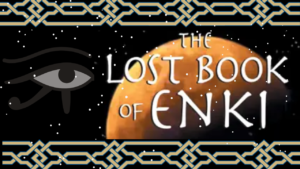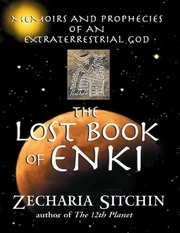Description
The Lost Book Of Enki
: A Summary
The Lost Book of Enki is an intriguing and controversial work written by Zecharia Sitchin, a researcher and author known for his theories on ancient Sumerian history and extraterrestrial influences on humanity. The book is part of his larger Earth Chronicles series, which proposes that ancient civilizations were influenced and even shaped by beings from another world: the Anunnaki. These extraterrestrial beings, according to Sitchin, played a pivotal role in human development, technology, and culture. The Lost Book of Enki presents a fictionalized account of these events, focusing on the perspective of Enki, one of the most important deities in Sumerian mythology.
Overview of the Book
The Lost Book of Enki is presented as the ancient texts and writings of the Sumerian god Enki, which have been “rediscovered” by Sitchin through his research. The book is framed as a collection of personal accounts, inscriptions, and stories that Enki supposedly recorded and passed down to humanity. These writings were purportedly found in the ruins of ancient Sumer, deciphered and translated, and now offer an alternative narrative to human origins.
In this narrative, Enki recounts the arrival of the Anunnaki on Earth and their involvement in the creation of humans. The book portrays the Anunnaki as extraterrestrial beings from a distant planet called Nibiru, who visited Earth thousands of years ago to mine gold and other resources. Sitchin’s interpretation of these events is rooted in the ancient Sumerian texts, which, according to him, hold clues about the Anunnaki’s true purpose on Earth.
The Anunnaki and Human Creation
A central theme of The Lost Book of Enki is the idea that the Anunnaki genetically engineered humans as a labor force. Enki, as one of the main Anunnaki gods, is depicted as playing a crucial role in this process. According to the book, the Anunnaki came to Earth to mine gold, which was essential to their home planet’s survival. However, the work was hard and dangerous, and the Anunnaki found it difficult to perform the labor themselves.
In order to alleviate the burden, Enki and his fellow Anunnaki decided to create humans by manipulating the genetic material of local primates, combining it with their own DNA to produce a new species. This hybrid race, which they called Adamu (humankind), was designed to serve as a workforce for the Anunnaki, performing labor that the extraterrestrials no longer wished to do themselves. The book suggests that this act of genetic manipulation laid the foundation for the rise of human civilization, as the Anunnaki taught their creations the necessary skills to build cities, mine resources, and create advanced technology.

The Role of Enki
Enki, the god who is credited with creating humanity, is depicted in Sumerian mythology as a wise and benevolent figure. In The Lost Book of Enki, he emerges as a compassionate leader who empathizes with the humans he helped create. While many of the other Anunnaki gods are portrayed as indifferent or even cruel, Enki sees humanity as more than just tools for labor. He is a protector and teacher, guiding the humans in the development of agriculture, writing, and other aspects of civilization.
Enki is also depicted as a god of wisdom and knowledge, who possesses a deep understanding of science, technology, and the natural world. He is credited with bringing humans the knowledge of writing, mathematics, medicine, and other critical areas that helped establish the foundation of human civilization. Throughout the book, Enki shares his insights and reflections on the human condition, offering an alternative view of ancient history.
The Role of the Anunnaki in Earth’s History
In Sitchin’s interpretation, the Anunnaki are not simply passive observers of Earth’s development—they actively shaped the course of human history. According to The Lost Book of Enki, the Anunnaki gods were deeply involved in the early stages of human civilization, guiding the development of agriculture, urbanization, and social structures.
The book also suggests that the Anunnaki’s involvement in human history was not always benevolent. The extraterrestrials are portrayed as powerful beings who imposed their will on the humans they created, often treating them as inferior. The Anunnaki are depicted as a ruling elite, with the humans serving as their labor force and subjects. As the story unfolds, it becomes clear that there were tensions between the Anunnaki gods themselves, with some supporting the welfare of humanity and others seeing the humans as nothing more than tools.
The Deluge and the Flood Story
A key event in The Lost Book of Enki is the story of the Great Flood, which bears similarities to the Biblical tale of Noah’s Ark. In Sitchin’s version, the flood is not a divine punishment but rather a result of the Anunnaki’s decision to wipe out humanity due to their perceived failure as a labor force. The flood is said to have been caused by a cataclysmic event that submerged much of the Earth, and only a small group of humans were saved by Enki, who secretly helped them escape. This event is a pivotal moment in the narrative, marking a dramatic shift in the relationship between the Anunnaki and humanity.
The story of the flood, as presented in The Lost Book of Enki, underscores the idea that the Anunnaki were directly involved in shaping the fate of humanity. While the biblical narrative portrays the flood as an act of divine retribution, Sitchin’s interpretation suggests that it was a calculated decision by the extraterrestrials to reset human civilization and start over.
The Legacy of the Anunnaki
In The Lost Book of Enki, Sitchin paints a picture of the Anunnaki’s lasting influence on human civilization. According to the book, the gods did not simply disappear after the flood but left behind a legacy that continues to affect humanity to this day. The knowledge and technology the Anunnaki imparted to humanity laid the groundwork for the rise of ancient civilizations, including the Sumerians, Babylonians, Egyptians, and others.
Sitchin’s work suggests that the Anunnaki’s influence can still be seen in modern society, particularly in the development of advanced technology and the pursuit of space exploration. He argues that the mysteries of ancient civilizations, such as their sudden advancements in science, mathematics, and engineering, can be explained by the intervention of these extraterrestrial beings.
Controversy and Criticism
While The Lost Book of Enki has captivated the imagination of many readers, it has also been met with significant criticism. Critics argue that Sitchin’s interpretation of Sumerian texts is highly speculative and often misrepresents ancient myths and historical events. His theories on extraterrestrial influence are not widely accepted within the academic community, and many scholars consider his ideas to be pseudoscience.
Despite the criticism, Sitchin’s work has gained a devoted following among those interested in ancient astronaut theories and alternative history. The Lost Book of Enki continues to be a popular text for those who believe that extraterrestrial beings played a role in shaping human civilization.
Conclusion
The Lost Book of Enki is a thought-provoking and controversial exploration of ancient Sumerian mythology, offering a unique interpretation of human history. Through the voice of Enki, Zecharia Sitchin presents a narrative that challenges conventional views of ancient civilization and suggests that humanity’s origins may be far more complex and extraordinary than previously thought. While the book remains contentious and divisive, it has sparked important discussions about the role of extraterrestrial beings in human history, the nature of ancient civilizations, and the mysteries of our origins. Whether viewed as an imaginative work of fiction or as a radical reinterpretation of ancient texts, The Lost Book of Enki continues to intrigue and provoke readers around the world.







Reviews
There are no reviews yet.